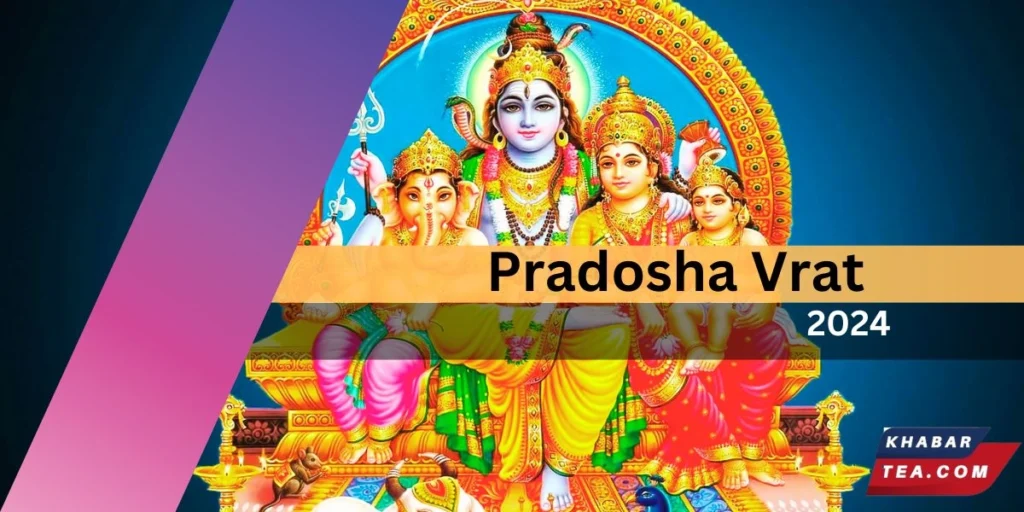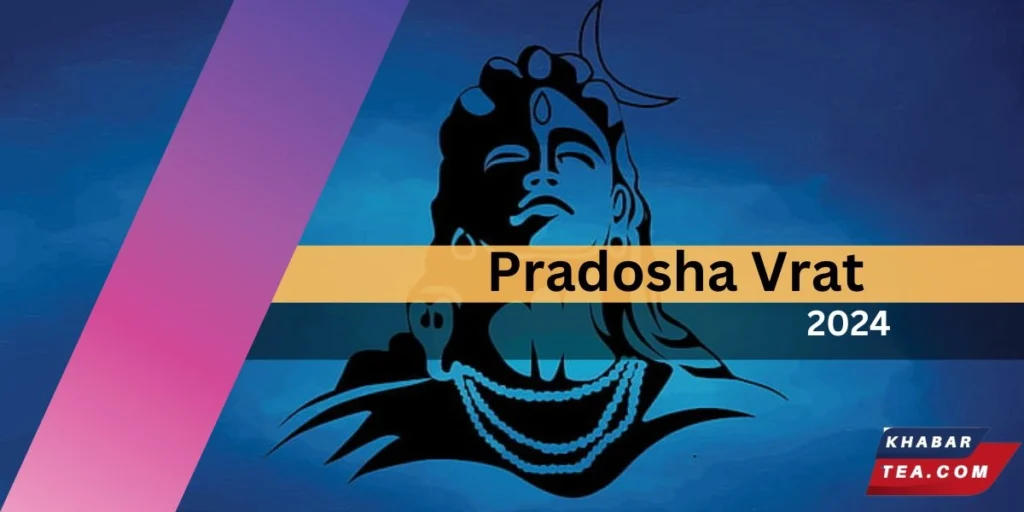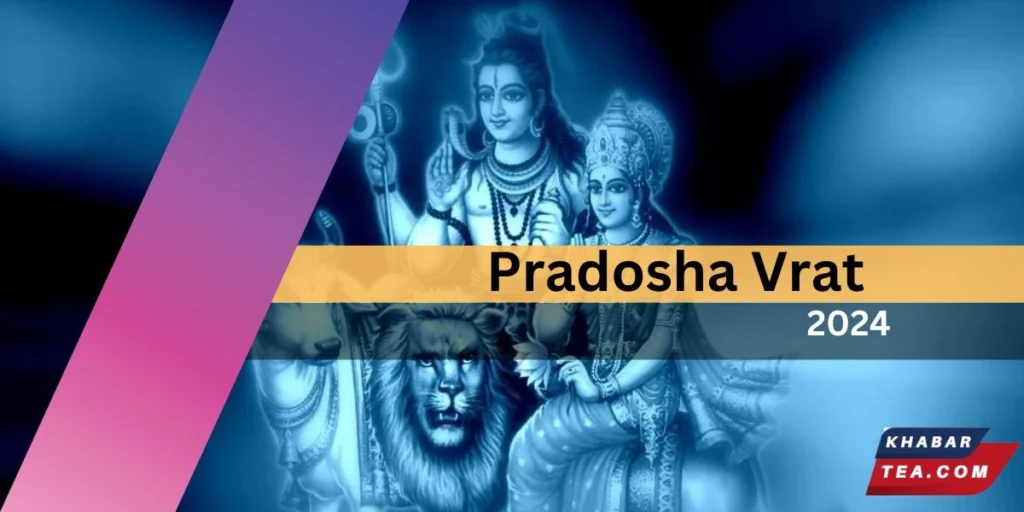
Pradosha Vrat: Let’s explore the mystical world of Pradosha Vrat, a sacred Hindu observance dedicated to Lord Shiva and Goddess Parvati. In this detailed blog post, we’ll look at the importance, rituals, and puja timings of Pradosha in 2024.
We’ll explain why this observance is significant, how the rituals are performed, and the best times to do the puja, making it easy for everyone to understand and follow.
Read More: Sitapur Murder Case 2024: The Man Took Lives of His Entire Family
Table of Contents
What Is Pradosha Vrat?

Pradosh Vrat, also called Pradosham, is a special fast observed twice a month on the Trayodashi tithi (the 13th day) during both the waxing (shukla paksha) and waning (krishna paksha) phases of the moon. Devotees keep this fast to get blessings from Lord Shiva and Goddess Parvati.
Pradosh Vrat is considered a very auspicious time, and the period known as Pradosh Kaal usually occurs during the evening twilight, called “Sandhyakal.” During this time, people pray, perform rituals, and seek the divine blessings of health, prosperity, and happiness.
Many devotees visit Shiva temples, offer milk, bilva leaves, and light lamps to honor Lord Shiva. Chanting mantras, reading sacred texts like the Shiva Purana, and singing devotional songs are also common practices during Pradosh Vrat. This observance is believed to remove negative karma and bring spiritual growth and well-being to the devotees.
Pradosha Vrat not only brings spiritual benefits but also fosters a sense of discipline and devotion in the lives of those who observe it. It is a time for self-reflection, gratitude, and seeking divine grace to overcome life’s challenges.
Types of Pradosha Vrat
| Soma Pradosham (Chandra Pradosham) | Observed on Mondays. |
| Bhauma Pradosham | Held on Tuesdays. |
| Shani Pradosham | Occurs on Saturdays. |
Pradosha Vrat Dates in 2024
Here’s a glimpse of the Pradosh Vrat dates for 2024:
| May 5, 2024 (Sunday) | Soma Pradosh Vrat (Krishna Paksha) |
| May 20, 2024 (Monday) | Soma Pradosh Vrat (Shukla Paksha) |
| May 21, 2024 (Tuesday) | Bhauma Pradosh Vrat (Shukla Paksha) |
Puja Timings for May 20, 2024
| Trayodashi Tithi Begins | 11:27 AM |
| Trayodashi Tithi Ends | 01:21 PM |
| Puja Muhurat | 05:48 PM to 08:17 PM |
Significance of Pradosha Vrat
During Pradosh, devotees worship Lord Shiva by giving him a special bath called abhisheka. They use sacred items like milk, honey, and water for this ritual bath.
While doing this, they chant Shiva mantras and offer bilva leaves, fruits, and incense to Lord Shiva. It is believed that the divine energy present during Pradosh can bring spiritual growth, good health, and eternal happiness to the devotees.

People often gather at temples during Pradosh to participate in these rituals. The atmosphere is filled with devotion and the sounds of chants and prayers. Many devotees also fast during the day, breaking their fast only after the evening rituals.
They believe that observing these practices with a pure heart and sincere devotion can help them receive the blessings of Lord Shiva, leading to a more peaceful and prosperous life.
Families often come together to perform these rituals at home if they cannot go to the temple. They set up a small altar with an image or idol of Lord Shiva and conduct the abhisheka and offerings there. The entire process is a way to show respect and love for Lord Shiva and seek his protection and blessings.
The Legend of Pradosha
According to Hindu mythology, during the churning of the cosmic ocean, called Samudra Manthan, a pot of poison known as halahala appeared. This poison was very dangerous and threatened to destroy the universe.
To save everyone, Lord Shiva drank the poison. But to stop the poison from harming him, Goddess Parvati held his throat. This made his throat turn blue, which is why he is called “Neelakantha,” meaning the blue-throated one.

Pradosha is a special time when devotees believe that Lord Shiva’s blessings are easiest to receive. During Pradosha, people often pray and make offerings to Lord Shiva, hoping for his grace and protection.
This story and the observance of Pradosha highlight the devotion to Lord Shiva and his role as a protector in Hindu tradition. Devotees believe that by worshiping during Pradosha, they can attain peace, prosperity, and relief from troubles.
Rituals and Observances
- Fasting: Devotees fast from sunrise to sunset during Pradosha. Some observe a partial fast, consuming only fruits, milk, and water.
- Abhisheka: The main ritual involves bathing the Shiva Linga with various substances. Milk, curd, honey, ghee, and water are commonly used.
- Mantras and Stotras: Recite Shiva mantras, such as the Maha Mrityunjaya Mantra and the Rudra Gayatri Mantra. Chanting the Shiva Tandava Stotram is also considered auspicious.
- Offerings: Offer bilva leaves, sandalwood paste, vermilion (kumkum), and flowers to Lord Shiva.
- Lighting Diyas: Light oil lamps or diyas in the temple or at home during the puja.
- Listening to Pradosha Katha: Narrate or listen to stories related to Pradosha, emphasizing Lord Shiva’s grace and compassion.
what are the Benefits of Pradosa Vrat?
People who observe Pradosha Vrat often say it brings a bunch of positive things into their lives. Here are some of the big ones:
- Deeper connection with the divine: Pradosha Vrat is like a special time to focus on your faith and get closer to whatever higher power you believe in. Devotees often spend this time praying, meditating, or chanting mantras.
- Overcoming hurdles: Life throws curveballs sometimes, but observing Pradosha Vrat is said to help clear those obstacles and smooth the way.
Making your wishes come true: Many people believe that observing Pradosha Vrat with a sincere heart can help their dreams and desires become reality. - Finding inner peace: Pradosha Vrat is all about calming your mind and finding that sense of peace and harmony within yourself. It can also be a great way to strengthen your relationships with others.
- Breaking free from the cycle of karma: Within the tradition of Pradosha Vrat, observing it with devotion is believed to help you work through negative karma and move closer to spiritual liberation.
It’s important to remember that these are the perceived benefits people experience through Pradosha Vrat. Whether you observe it or not, the most important thing is to find practices that bring you peace and fulfillment.
Conclusion
As you observe Pradosha Vrat, take the time to immerse yourself in devotion, connect with the cosmic energies, and experience the divine grace of Lord Shiva. This sacred practice is a wonderful opportunity to find inner peace and receive blessings. By participating in this ritual, you align yourself with the powerful energies of the universe and deepen your spiritual connection.
Feel free to share your experiences or ask any questions you may have!
Note: all the details collected from media sources and internet
Frequently Asked Questions (FAQs)
What is Pradosha Vrat?
Pradosha Vrat, also known as Pradosham, is a sacred Hindu observance dedicated to Lord Shiva and Goddess Parvati. It occurs twice a month on the Trayodashi tithi (the 13th day) during both the waxing (shukla paksha) and waning (krishna paksha) lunar phases.
When are the Pradosha Vrat dates in 2024?
In 2024, Pradosha Vrat falls on the following dates:
May 5, 2024 (Sunday): Soma Pradosh Vrat (Krishna Paksha)
May 20, 2024 (Monday): Soma Pradosh Vrat (Shukla Paksha)
May 21, 2024 (Tuesday): Bhauma Pradosh Vrat (Shukla Paksha)
How do devotees observe Pradosha Vrat?
Devotees follow these rituals during Pradosha:
Fasting: From sunrise to sunset, devotees fast as an act of devotion.
Abhisheka: They perform ritual baths (abhisheka) of the Shiva Linga using milk, honey, ghee, and water.
Mantras and Stotras: Reciting Shiva mantras and stotras brings blessings.
Offerings: Bilva leaves, sandalwood paste, vermilion, and flowers are offered to Lord Shiva.
Listening to Pradosha Katha: Devotees narrate or listen to stories related to Pradosha.
What is the legend behind Pradosha Vrat?
According to Hindu mythology, during the cosmic churning (Samudra Manthan), Lord Shiva consumed the poison (halahala) to save the universe. Goddess Parvati held his throat, turning it blue. Pradosha is when Lord Shiva’s grace is most accessible.










